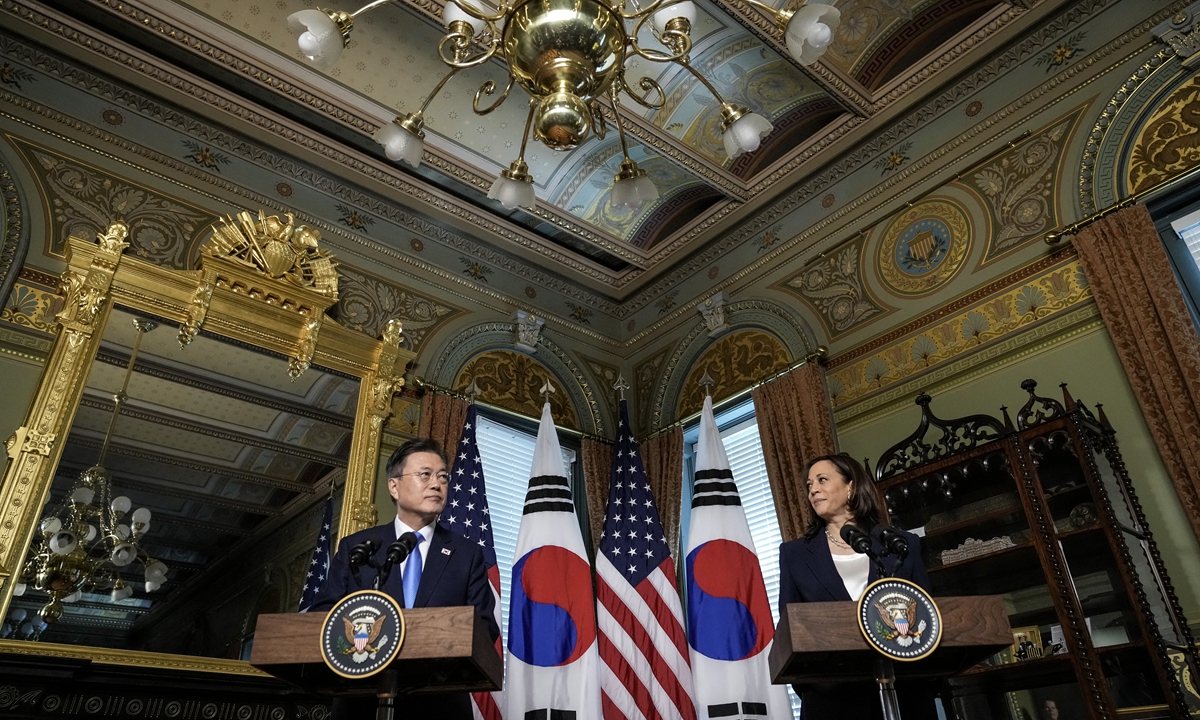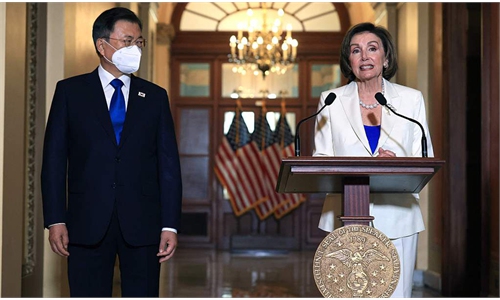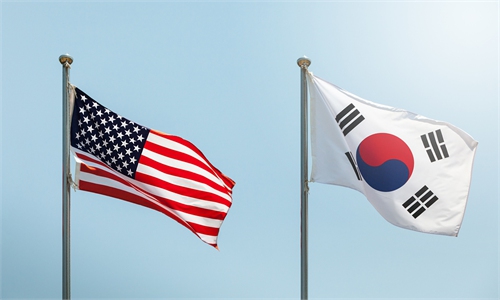
US Vice President Kamala Harris and Korean President Moon Jae-in address the media prior to a meeting in the Eisenhower Executive Office Building on Friday in Washington, DC. Photo: AFP
A diplomatic episode during South Korean President Moon Jae-in's visit to the US last week unmasked the US contempt and hypocrisy toward its allies.Following the joint press conference by Moon and US Vice President Kamala Harris on Friday US time, Harris was caught on camera "wiping" her hand immediately after shaking hands with Moon. This is a rare scene in formal diplomatic occasions.
Controversies have surfaced on social media and a few US media outlets like Fox News and the New York Post, while most mainstream US pro-establishment media have remained silent, as if they did not notice it at all. It may be just a tidbit, yet the episode mirrors some kind of US mentality toward its allies - an insincere mind-set.
Granted, possible scenarios could be: Harris may have mysophobia (an irrational fear of dirt), it may be a habit without ill intentions, or Harris might not have received proper training on diplomatic protocols. Yet if those are excluded, there would be one explanation left - the US is filled with the sense of superiority, and it simply looks down on, or even disdains, other countries automatically.
If Washington treats Seoul as an equal with genuine sincerity, how could it possibly not know that its ally South Korea, like other East Asian countries, attaches great significance to social etiquette? Not to mention the move is disrespect in most cultures. Yet Harris did it in front of cameras. South Korea people will naturally feel uncomfortable.
Some South Korean netizens raised their voices on the move, calling it insulting. Some even asked, "Is the US still our ally?" according to media reports.
The incident may pour cold water on some South Korean people who used to look up to the US, making them wake up to the actual weight of Seoul in the eyes of Washington.
Harris' failure to notice the sensitive detail in diplomacy showed US elites' arrogance, and by wiping her hand, the arrogance might hurt others' self-esteem, Li Haidong, a professor with the Institute of International Relations at China Foreign Affairs University, told the Global Times on Tuesday.
It is not the first time to witness the US not respecting its East Asian allies. In 2019, during then Japanese prime minister Shinzo Abe's visit to Washington, then US president Donald Trump did not even bother to make room for Abe when having group photos taken on the red carpet in front of the White House, when Abe and his wife were standing outside the carpet, awkwardly.
The US, which has been hailing and promoting "equality" and "freedom" all over the world, is itself a country full of discrimination. At home, its racial controversies never stop. Abroad, it never regards its allies as real equal partners.
For the US, allies, be they Japan or South Korea, may be crucial. But deep down in Washington's heart, they are sidekicks which the US could take advantage of, give orders, ignore diplomatic protocols and not care about their feelings. When Biden stepped into the White House, he wowed to rebuild US alliances. Unfortunately, his team seems to be no better than Trump's in this regard.
The episode may not have much impact on Washington-Seoul relations. Yet dissatisfaction among South Korean people toward the US may rise. Unlike experts or international affairs observers, who tend to analyze news stories from a rational perspective, ordinary people care more about their intuitive feelings.
Some South Korean netizens' disappointment and interpretation of Harris' gesture may come from their lack of self-confidence, as Seoul's diplomacy has not been independent enough under US pressure.
There are always anti-US forces in South Korea, which have been complaining about their country's foreign policy of following the US closely.
The latest episode may make them more convinced that relying heavily on the US is no longer feasible, as they could not even be treated with respect. This will surely set some hitches for the US, which is eagerly promoting its Indo-Pacific strategy, Li said.



